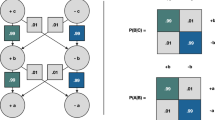Abstract
The paper argues that the two best known formal logical fallacies, namely denying the antecedent (DA) and affirming the consequent (AC) are not just basic and simple errors, which prove human irrationality, but rather informational shortcuts, which may provide a quick and dirty way of extracting useful information from the environment. DA and AC are shown to be degraded versions of Bayes’ theorem, once this is stripped of some of its probabilities. The less the probabilities count, the closer these fallacies become to a reasoning that is not only informationally useful but also logically valid.
Similar content being viewed by others
References
Aristotle, (1938). De Sophisticis Elenchis. On sophistical refutations (trans: Forster, E. S.). On with the Cosmos/by Furley, D. J. Cambridge, MA: Harvard University Press.
Chater N., Oaksford M. (2008) The probabilistic mind: Prospects for Bayesian cognitive science. Oxford University Press, Oxford
Floridi L. (2008) Understanding epistemic relevance. Erkenntnis 69(1): 69–92
Griggs R.A., Cox J.R. (1982) The elusive thematic-materials effect in Wason’s selection task. British Journal of Psychology 73: 407–420
Hahn U., Oaksford M. (2006) A Bayesian approach to informal argument fallacies. Synthese, 152(2): 207–236
Hamblin C.L. (1970) Fallacies. Methuen, London
Hansen, H.V., Pinto, R.C. (eds) (1995) Fallacies: Classical and contemporary readings. University Park, PA, Pennsylvania State University Press
Josephson J.R. (2000) Smart inductive generalizations are abductions. In: Flach P.A., Kakas A.C. (eds) Abduction and induction: Essays on their relation and integration. Kluwer, Dordrecht, Boston
Marcus S.L., Rips L.J. (1979) Conditional reasoning. Journal of Verbal Learning and Verbal Behavior 18: 199–224
Stein E. (1996) Without good reason: The rationality debate in philosophy and cognitive science. Clarendon Press, Oxford
Verschueren N., Schroyens W., Schaeken W., d’Ydewalle G. (2001) Why do participants draw non-valid inferences in conditional reasoning? Current Psychology Letters: Behaviour, Brain, & Cognition 6:57–70
Wason P.C. (1966) Reasoning. In: Foss B.M. (eds) New horizons in psychology. Penguin, Harmondsworth, pp 135–151
Woods J., Walton D.N. (1982) Argument : The logic of the fallacies. McGraw-Hill Ryerson, Toronto
Author information
Authors and Affiliations
Corresponding author
Rights and permissions
About this article
Cite this article
Floridi, L. Logical fallacies as informational shortcuts. Synthese 167, 317–325 (2009). https://doi.org/10.1007/s11229-008-9410-y
Received:
Revised:
Accepted:
Published:
Issue Date:
DOI: https://doi.org/10.1007/s11229-008-9410-y




